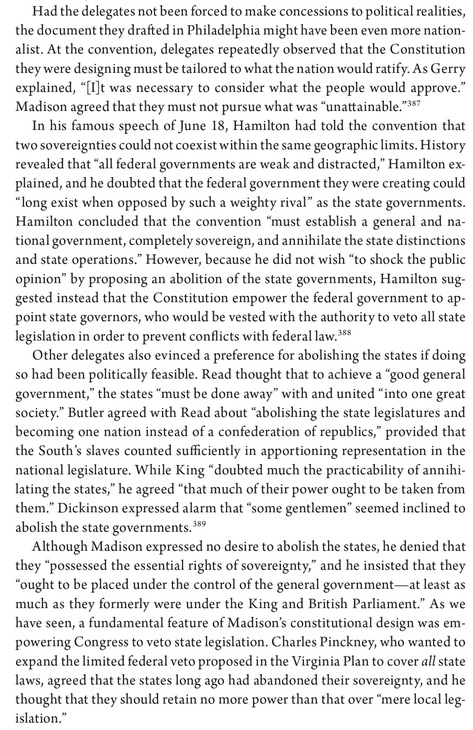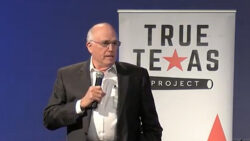For over a decade, right-wing activists and elected leaders have been pressing state legislators to call for a dangerous Convention of States that would consider constitutional amendments to radically alter American government and society by making much of what the federal government now does unconstitutional.
As stipulated by Article V of the Constitution, a convention for proposing amendments must be held when legislatures of two-thirds of the states call for one. For years, right-wing activists have been working diligently to bring one about because they see it as a way “to reverse 115 years of progressivism” by introducing amendments for ratification that would drastically curtail the power of the federal government.
Last week, the Convention of States Foundation held a simulated Article V convention in Colonial Williamsburg, Virginia, to allow these activists to practice in anticipation for the day when an official Article V convention takes place.
Likening themselves to the Founding Fathers, organizers of the event beseeched the attendees, many of whom were current or former state legislators, to “take back” power from the federal government, just as the framers of the Constitution supposedly intended.
This was, in fact, the central focus on former Sen. Rick Santorum’s opening remarks to the convention.
“One of the things that I hear all the time as I travel around the country is people talk about the Constitution and [how] we can’t mess with the Constitution,” Santorum said. “I think people forget that the Constitution was written by folks like you; they were almost all state legislators. They weren’t congressmen. They weren’t people from the federal government. They were people from the states.”
“Not surprisingly,” he continued, “they wrote the Constitution to keep them in power. They had to give more power to the federal government than the Articles of Confederation, but they wanted you folks—the state legislatures, the states—to be at the top of the food chain. So when people say, ‘Well, don’t mess with the Constitution,’ does anybody believe that the states are at the top of the food chain?”
Given Santorum’s interest in promoting an Article V convention, it is shocking but not particularly surprising that his understanding of the intention of those who drafted the Constitution is fundamentally wrong.
The Constitutional Convention in 1787 has held precisely because the national government under the Articles of Confederation—in which the states were, as Santorum put it, “at the top of the food chain”—was fundamentally inadequate and ineffective at addressing the issues facing the nascent United States of America.
As professor George William Van Cleve wrote in his book, “We Have Not a Government: The Articles of Confederation and the Road to the Constitution,” a main concern of those who served in the Confederation Congress was that the national government lacked “the ability to enforce its decisions over state opposition.”
George Washington drove this point home in a letter he wrote to John Jay in 1786:
We have errors to correct; we have probably had too good an opinion of human nature in forming our confederation. Experience has taught us, that men will not adopt and carry into execution measures the best calculated for their own good, without the intervention of a coercive power. I do not conceive we can exist long as a nation without having lodged some where a power, which will pervade the whole Union in as energetic a manner, as the authority of the State Governments extends over the several States.
As historian Richard Beeman explained in his book “Plain, Honest Men: The Making of the American Constitution,” the purpose of the Constitutional Convention from the outset was to draft a document that remedied the faults of the Articles of Confederation and placed the national government, not the states, “at the top of the food chain.”
“On the third full day of business,” Beeman wrote, “the Convention rejected the principle of federalism on which the America republic had been founded and endorsed in its place the notion of a supreme national government.”
In fact, a centerpiece of the plan to create a new, more powerful national government crafted by James Madison, widely acknowledged as being “The Father of the Constitution,” was something that Madison called a “federal negative” that would have given the national government the power to veto laws passed by any state legislature.
The fact that such a federal veto never made it into the final draft of the Constitution can be attributed more to the realization that ratification would require the assent of the states, which were unlikely to ratify a document containing such a provision, rather than to opposition from the convention delegates.
As historian Michael Klarman explained in “The Framers’ Coup: The Making of the United States Constitution,” many delegates favored eliminating the states entirely:

While the Constitution approved by the convention and ratified by the states obviously did not abolish state governments, it did include what is known as the Supremacy Clause, which explicitly affirms that the federal Constitution and laws prevail over state constitutions and laws.
Far from being drafted by a group of state legislators intent on keeping themselves and their states “at the top of the food chain,” the Constitution was actually drafted by a group of legislators who had directly experienced the impotence of the national government under the Articles of Confederation and were intent on remedying its central flaw; namely, that the states had too much power.
We need your help. Every day, Right Wing Watch exposes extremism to help the public, activists, and journalists understand the strategies and tactics of anti-democratic forces—and respond to an increasingly aggressive and authoritarian far-right movement. The threat is growing, but our resources are not. Any size contribution—or a small monthly donation—will help us continue our work and become more effective at disrupting the ideologies, people, and organizations that threaten our freedom and democracy. Please make an investment in Right Wing Watch’s defense of the values we share.








